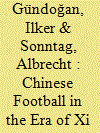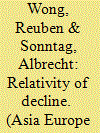|
|
|
Sort Order |
|
|
|
Items / Page
|
|
|
|
|
|
|
| Srl | Item |
| 1 |
ID:
165961


|
|
|
|
|
| Summary/Abstract |
Football has become a field of high priority for development by the central government of the People's Republic of China. After Xi Jinping took office as General Secretary of the Chinese Communist Party in 2012, a football development strategy was launched, including four “comprehensive” reforms. The purpose of this study is to examine the perceptions of these reforms by Chinese football supporters – a fundamental stakeholder group – through an online survey. Particular emphasis was laid on how nationalistic attitudes underpin supporters' expectations, especially with regard to the concept of the “Chinese Dream.” In addition, issues of football governance were also addressed.
|
|
|
|
|
|
|
|
|
|
|
|
|
|
|
|
| 2 |
ID:
111029


|
|
|
|
|
| Publication |
2012.
|
| Summary/Abstract |
This article is an attempt, in the context of the Eurozone crisis that has shaken Europe since 2008, to explore and deconstruct two pieces of conventional wisdom on French leadership in Europe and the world. The stereotypical image of a country in decline and denial, out of touch with today's globalised world, is reproduced so often in the Anglo-American media and even in scholarly discourse, that is has become a self-evident truism. The article examines this truism in two different perspectives: there is, on the one hand, the axiom that France has lost influence in Europe and that the balance of power has shifted inexorably to Germany and, on the other hand, the axiom that Europe does not matter in the global 'power shift' and that, as part of Europe, France does not count any more either. In questioning the origins and validity of these axioms, the authors argue that a strong perception bias persists and is constantly perpetuated even though reality has changed. Not only has France rather successfully adapted to globalisation in both political and economic terms, but it has also found new ways and discourses about its role as Germany's partner in leadership in the European Union. The paper goes on to show that both France and the EU retain and use significant levers for action in three dimensions of power-coercion, agenda-setting and attraction. It concludes that going into 2012, France remains an active and important actor, both in the EU and on the global scene. It is present and influential in major international institutions, effectively builds international coalitions and floats important ideas on reforming laissez-faire capitalism.
|
|
|
|
|
|
|
|
|
|
|
|
|
|
|
|
|
|
|
|
|